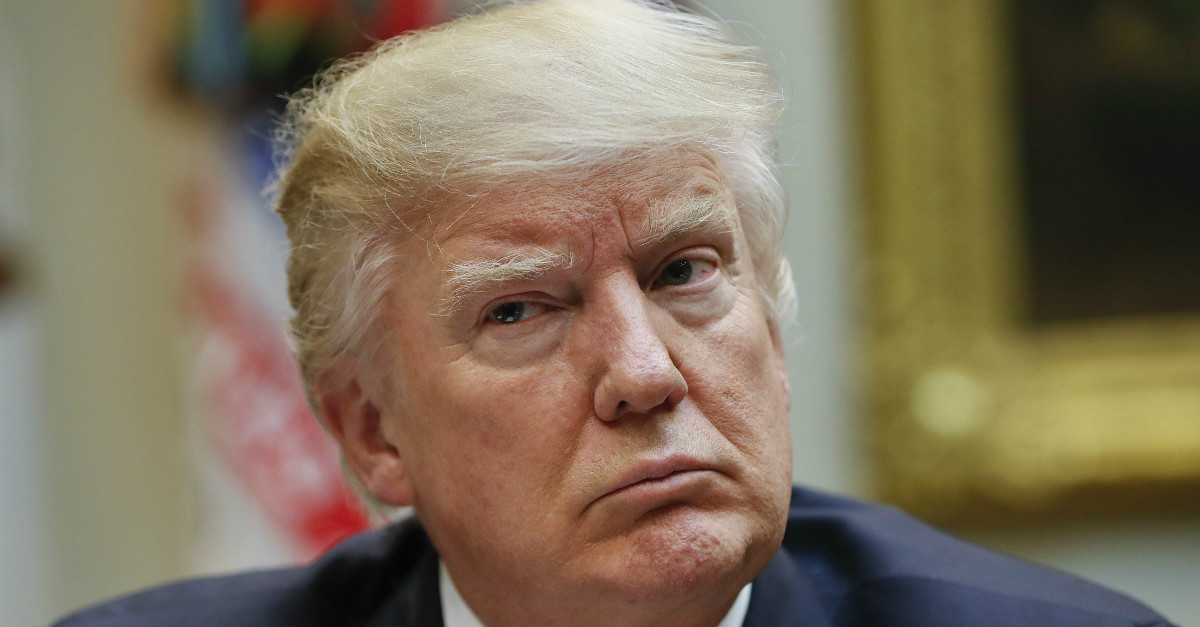After spending his campaign slapping around previous commanders-in-chief for getting too immersed in foreign wars, President Donald Trump has decided to swan-dive into the Middle East. The alacrity with which he’s shed his anti-war skin is impressive even by politician standards.
Videos by Rare
In Syria, the president is deploying 400 more Marines in preparation to siege the ISIS capital of Raqqa. In Iraq, paratroopers are on the way to reinforce government troops in Mosul, where Trump has also relaxed rules of engagement, dropping more bombs, including one that recently resulted in one of the deadliest ever civilian casualty counts from a single American airstrike. And in Yemen, Trump is ramping up drone attacks and loosening restrictions on a Saudi-led bombing campaign.
There is a narrow justification for each of these missions: fighting terror in Syria, freeing Mosul in Iraq and stymieing Iran-backed rebels in Yemen. But pull back for a moment and consider the broader context. George W. Bush took America into Afghanistan following 9/11 and then occupied Iraq after felling Saddam Hussein’s regime. Barack Obama pulled the troops out of Iraq, but arguably escalated our overall commitment to the region, sending more troops to Afghanistan and intervening in Libya and in Syria, waging a panoramic drone campaign.
For all this involvement, has the Middle East gotten safer, more democratic and more commodious to American interests? It has not. The region, which in 2001 was ruled by a network of strongmen, most of whom were reasonably opposed to al-Qaeda terrorism, has today become unspooled, from Syria to Iraq to Afghanistan to Libya to the Sinai Peninsula. Not only that, the enemy has reached our front yard. A new report finds that in a certain neighborhood, 51 groups were found to have suspected ties to terrorism; that unlucky locale is Molenbeek in Brussels, Belgium, near the very heart of the European Union.
How did more than a decade and a half of committed anti-terrorism efforts lead to this? There are at least three reasons.
RELATED: Saudi Arabia gushes over Donald Trump for all the wrong reasons
The first is frustration in the Middle East. The Muslim world last held real global power during the Ottoman Empire. Since then, the region has tried a number of arrangements—secularization under Ataturk, Arab nationalism under Nasser, economic alliance with the United States—all of which, as Michael Brendan Dougherty points out, have only resulted in further diminishment. This has engendered frustration in many Muslims: perhaps, they ponder, Allah demands something more violent if greatness is to be reclaimed.
The second reason is that the lid has come off the conflict between the Sunnis and Shias, which for most of Muslim history wasn’t much of a conflict at all. The Shias largely (though not entirely) took a “quietist” approach, accepting their minority status and waiting for the Twelfth Imam to return, while the Sunnis were accepted as their rulers. The Islamic Revolution in 1979 changed that, as Shias gained real political power in Iran, but it was the removal of Saddam Hussein and the subsequent empowerment of the Shia majority in Iraq that set off the conflagration. Sunnis, furious at their loss of Baghdad, reacted by spilling blood, and the blazes of this sectarian war have been spreading ever since.
The third reason is poverty. Sorry, fellow conservatives, the so-called “root causes” of terrorism do matter, and none so much as the inabilities of young Arab men to economically better their condition. This economic stagnation is most vivid in Iraq, where an entire generation has grown up knowing nothing but war and its consequent immiseration, but it can also be found in Yemen, where the UN warns a nationwide famine is approaching, and even in Western European nations, where unemployment in some Muslim districts is as high as 40 percent. Poverty breeds desperation, which breeds susceptibility to extremist groups, especially when they come calling with seductive promises of lucrative paydays.
RELATED: Here’s how James ‘Mad Dog’ Mattis plans to defeat ISIS
It will not have escaped your notice that, on the second and third causes, America’s wars have been part of the problem, uncorking sectarian tensions and deepening poverty. The Trump policy is more of the same, emphasizing short-term victories over specific enemies at the expense of a broader and more sober assessment—how can the past 16 years possibly be hailed as a net triumph?
We are trapped in a spin cycle where our actions help make terrorism worse, and we use worsened terrorism as a justification for more action. With Trump only accelerating these revolutions, the Middle East looms as imposingly before us as it did in 2001.



